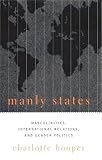Manly States : Masculinities, International Relations, and Gender Politics / Charlotte Hooper.
Material type: TextPublisher: New York, NY : Columbia University Press, [2001]Copyright date: ©2001Description: 1 online resource (224 p.)Content type:
TextPublisher: New York, NY : Columbia University Press, [2001]Copyright date: ©2001Description: 1 online resource (224 p.)Content type: - 9780231120753
- 9780231505208
- 305.31
- online - DeGruyter
- Issued also in print.
| Item type | Current library | Call number | URL | Status | Notes | Barcode | |
|---|---|---|---|---|---|---|---|
 eBook
eBook
|
Biblioteca "Angelicum" Pont. Univ. S.Tommaso d'Aquino Nuvola online | online - DeGruyter (Browse shelf(Opens below)) | Online access | Not for loan (Accesso limitato) | Accesso per gli utenti autorizzati / Access for authorized users | (dgr)9780231505208 |
Frontmatter -- Contents -- Illustrations -- Acknowledgments -- Introduction -- Part one. Theorizing Masculinities -- Chapter one. The Construction of Gender Identity -- Chapter two. Masculinities and Masculinism -- Part two. Masculinities, IR, and Gender Politics -- Chapter three. Masculinities in International Relations -- Chapter four. The Economist's Masculine Credentials -- Chapter five. The Economist, Globalization, and Masculinities -- Chapter six. The Economist/IR Intertext -- Conclusion: IR and the (Re)Making of Hegemonic Masculinity -- Notes -- Reference List and Bibliography -- Index
restricted access online access with authorization star
http://purl.org/coar/access_right/c_16ec
Much has been written on how masculinity shapes international relations, but little feminist scholarship has focused on how international relations shape masculinity. Charlotte Hooper draws from feminist theory to provide an account of the relationship between masculinity and power. She explores how the theory and practice of international relations produces and sustains masculine identities and masculine rivalries.This volume asserts that international politics shapes multiple masculinities rather than one static masculinity, positing an interplay between a "hegemonic masculinity" (associated with elite, western male power) and other subordinated, feminized masculinities (typically associated with poor men, nonwestern men, men of color, and/or gay men). Employing feminist analyses to confront gender-biased stereotyping in various fields of international political theory-including academic scholarship, journals, and popular literature like The Economist-Hooper reconstructs the nexus of international relations and gender politics during this age of globalization.
Issued also in print.
Mode of access: Internet via World Wide Web.
In English.
Description based on online resource; title from PDF title page (publisher's Web site, viewed 02. Mrz 2022)


